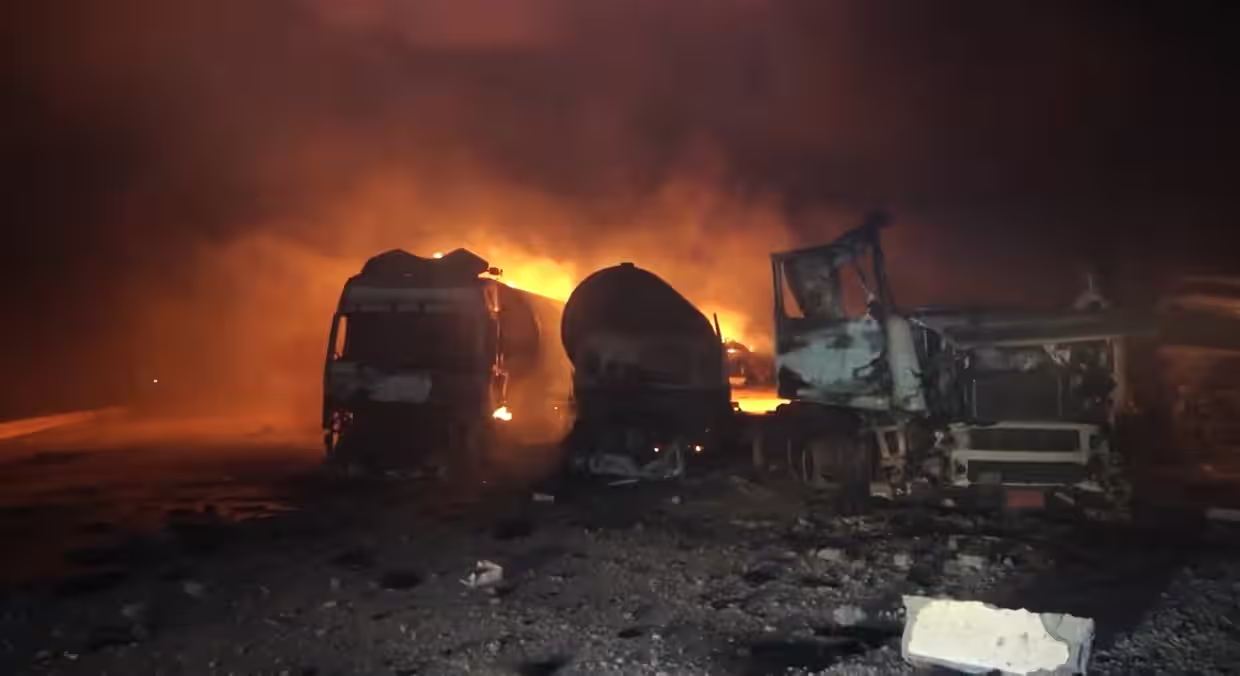The U.S. military confirmed airstrikes on Yemen’s Ras Isa oil port early Friday that, according to Houthi rebels, killed 38 people and injured 102.
The strike, one of the deadliest since the U.S. began targeting Houthi positions on March 15, hit a key oil facility under Houthi control in Yemen’s Hodeida governorate.
Al-Masirah, the Houthi-run satellite channel, aired graphic footage showing corpses and widespread destruction. The network claimed paramedics and civilian workers were among the dead. The blast ignited large fires that were visible from space, according to NASA satellite data.
U.S. Central Command: Target Was Fuel Revenue
In a statement, U.S. Central Command said the strike aimed to “eliminate this source of fuel for the Iran-backed Houthi terrorists and deprive them of illegal revenue that has funded Houthi efforts to terrorize the entire region for over 10 years.”
“This strike was not intended to harm the people of Yemen, who rightly want to throw off the yoke of Houthi subjugation and live peacefully,” it added. However, it did not acknowledge the reported civilian casualties and declined to comment further when asked by the Associated Press.
Strategic Port Hit as War Deepens
Ras Isa, near Kamaran Island, contains three oil storage tanks and refining equipment. It also marks the endpoint of a pipeline running from Yemen’s Marib region, a stronghold of the exiled Yemeni government. While oil exports have been halted due to the ongoing conflict, the Houthis reportedly use the port to import oil.
The Houthi movement condemned the attack as a breach of national sovereignty. “This completely unjustified aggression represents a flagrant violation of Yemen’s sovereignty and independence and a direct targeting of the entire Yemeni people,” the group said in a statement via its SABA news agency.
U.S. Warns of Oil Shipments to Houthi Ports
Earlier this month, the U.S. State Department warned that it would penalize any country or company that supported the Houthis, including by provisioning oil or offloading cargo at ports under their control.
“The United States will not tolerate any country or commercial entity providing support to foreign terrorist organizations, such as the Houthis,” the warning stated.
Houthis Fire Missile at Israel
Shortly after the U.S. strike, the Houthis launched a missile toward Israel, prompting sirens in Tel Aviv and other areas. The Israeli military intercepted the missile without reports of damage or casualties. The group has claimed it is acting in solidarity with Palestinians in Gaza, where Israel continues its military operations.
U.S. Accuses Chinese Satellite Firm of Helping Houthis
Tensions further escalated as the U.S. accused Chinese firm Chang Guang Satellite Technology Co. Ltd. (CGSTL) of helping the Houthis target U.S. and allied ships in the Red Sea.
State Department spokesperson Tammy Bruce said CGSTL, linked to China’s military, provided satellite images used in attacks on commercial and military vessels. “Beijing’s support… certainly contradicts their claims of being peace supporters,” Bruce said, citing a Financial Times report.
The U.S. had previously sanctioned CGSTL in 2023 for allegedly supporting Russia’s Wagner Group in Ukraine. Chinese officials have not yet responded to the new accusation.
Trump Administration Ramps Up Military Pressure
The current U.S. military campaign under President Donald Trump appears to be more extensive than efforts under former President Joe Biden. Initially focused on missile launch sites, recent U.S. strikes have expanded to include urban targets and high-ranking personnel.
The offensive began after the Houthis threatened to resume targeting “Israeli” ships in response to Israel’s blockade of Gaza. Their definition of Israeli-linked ships has been vague, creating uncertainty across commercial shipping lanes.
From November 2023 to January 2024, the Houthis targeted over 100 merchant vessels, sank two, and killed four sailors, disrupting global trade through the Red Sea—a corridor that typically carries $1 trillion in annual goods.
Despite repeated U.S. and Israeli airstrikes, the Houthis continue to launch attacks, posing a persistent threat to maritime security and escalating a regional conflict that is becoming increasingly international in scope.






